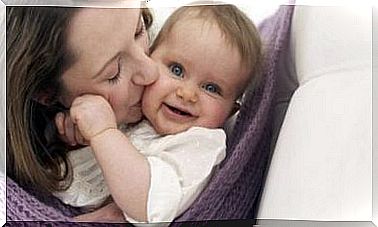Mama, Hold Me Tight … The Release Of Fears

This is how you give the world a strong and courageous child. A person who has managed to get rid of fears.
Today we’re going to show you the importance of raising your child in an environment that encourages physical contact. Body contact is the best driving force: it promotes the development of your children, gives security and well-being. It also promotes the neural connection to tactile, vocal, olfactory and sensory stimuli.
In this article, we want to go beyond the maturing child and talk about their primary instincts and the importance of parenting that is free from fears. Nowadays the word “bond” is used very often. But before we go any further, we first need to clarify a few terms.
In the field of personal development, “attachment” refers to our tendency to acquire certain things or to detach from fears that impede our freedom or identity.
On the other hand, one finds attachment, in connection with raising children, in the classic Bowlby theory. She reminds us that it is important to form a strong and secure bond with the child in order to build development and self-confidence. This ultimately enables him to develop his independence.
With this article we would like to suggest the following to you: through intensive attention and skin-to-skin contact, a positive bond is created between you and your child. In this way, you can raise a child long-term who is free from fears, insecurities, and low self-esteem.
Fear is the most important instinct in a newborn’s brain

There is no place safer, more perfect and more comfortable than the womb. Nothing bad happens here, everything is calm, everything is warm, satisfying and predictable. However, birth exposes the newborn to a very strange new world.
- The first thing babies feel is that they are being torn from inside their mother. After that, a stranger holds her, bathes her, weighs her and takes care of her.
Later, after having got to know and feel their mother for the first time, they notice how they are now and then put in the lonely and dark cradle. Their fears hover over them and they feel the horror of helplessness and the feeling that they cannot go on living …
I was just born and everything scares me
Babies are born with an immature brain. They are driven by instincts and needs and all they want is to feel safe, loved, and cared for.
- If there is one thing that scares the newborn in the first few months, it is separation from the mother. At this age they do not yet understand that they will not be abandoned just because they are alone in the cradle. They do not yet understand that nothing bad will happen just because they do not feel the mother’s warmth.
The instinct of fear is a natural response with one goal: to help them adjust. We don’t want to go into this any further.
Breaking away from fears: an indispensable daily investment

Parenting experts and child psychologists say nearly 35% of babies develop insecure attachment. This can be caused by growing up in an environment where parents ignore the need for emotional attention from an early age. An environment in which parents do not care for their crying child or where children realize that they cannot rely on their caregivers when they are needed.
This lack of attachment definitely leads to serious mental impairment.
Insecure attachment leads children to become dependent. They are always “tied” to their insecurities and fears. Linked to this frustration, which they cannot channel, other demanding behaviors arise, such as disobedience and anger.
How to encourage your child to let go of fears
Understand that your baby has strong needs that you cannot neglect.
- Always remember that every baby is unique. Some are much more demanding and needy than others.
- Give them affection when they cry.
- Always be close to her. When you work or are away from home for much of the day, use classic baby slings to keep them close to your skin and chest.
- You should understand all of their emotions and not punish them any more for them or reinforce them. It’s about being patient, always approachable, loving, and consistent in your rules.
- Know your children’s fears.
- Gradually increase your tolerance for frustration.
Make sure to encourage them and build their self-esteem. Show your children that you trust them. Make sure they see you as a wonderful and reliable figure in their life. A figure who always offers them security, encouragement, affection and closeness …









